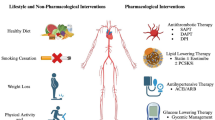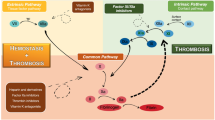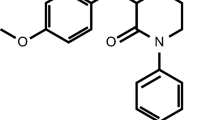Abstract
Objective We sought to compare platelet inhibition produced by three antiplatelet regimens. Methods and results Sixty NSTE-ACS patients undergoing coronary angiography treated with aspirin and enoxaparin were randomised to receive tirofiban 0.4 μg/kg/min over 30 min plus 0.15 μg/kg/min over 24 h (A), clopidogrel 600 mg (B), clopidogrel 300 mg plus tirofiban (C); blood samples were taken at baseline and 2, 6 and 24 h after the drug administration, and were analyzed by light transmission aggregometry and flow cytometry. Treatment with clopidogrel 600 mg significantly reduced P-selectin expression in comparison with tirofiban alone at all time points (group B vs. A: P < 0.0001). However tirofiban inhibited platelet aggregation significantly more than clopidogrel 600 mg during the first 6 h (group A vs. B: P < 0.0001), and the addition of clopidogrel 300 mg did not inhibit platelet aggregation any more than tirofiban alone throughout the 24 h (group C vs. A: P = NS). All of the changes over time within each group were highly significant (P < 0.0001). Conclusions Tirofiban leads to greater early inhibition of platelet aggregation but less suppression of P-selectin expression than clopidogrel 600 mg. The addition of clopidogrel to tirofiban does not add any anti-aggregatory effect, but reduces P-selectin expression, thus likely adding a significant biological and clinical protective effect and providing a rationale for the combined use of the two drugs.
Condensed abstract We sought to compare platelet inhibition produced by three antiplatelet regimens using light transmission aggregometry and flow cytometry. Tirofiban leads to greater early inhibition of platelet aggregation but less suppression of P-selectin expression than clopidogrel 600 mg, thus providing the rationale for the combined use of the two drugs.

Similar content being viewed by others
References
Antithrombotic Trialist Collaboration (2002) Collaborative meta-analysis of randomised trials of antiplatelet therapy for prevention of death, myocardial infarction and stroke in high risk patients. BMJ 324:71–86
Yusuf S, Zhao F, Mehta SR, Chrolavicius S, Tognoni G, Fox KK (2001) Clopidogrel in Unstable Angina to Prevent Recurrent Events Trial Investigators. Effects of clopidogrel in addition to aspirin in patients with acute coronary syndromes without ST-segment elevation. N Engl J Med 345:494–502
Mehta SR, Yusuf S, Peters RJ, Bertrand ME, Lewis BS, Natarajan MK, Malmberg K, Rupprecht H, Zhao F, Chrolavicius S, Copland I, Fox KA (2001) Clopidogrel in Unstable Angina to Prevent Recurrent Events trial (CURE) investigators. Effects of pre-treatment with clopidogrel and aspirin followed by long-term therapy in patients undergoing percutaneous coronary intervention: the PCI-CURE study. Lancet 358(9281):527–533
Bertrand ME, Simoons ML, Fox KA, Wallentin LC, Hamm CW, McFadden E, De Feyter PJ, Specchia G, and Ruzyllo W (2002). Management of acute coronary syndromes in patients presenting without persistent ST-segment elevation. Eur Heart J 23(23)
Roffi M, Chew DP, Mukherjee D, Bhatt DL, White JA, Moliterno DJ, Heeschen C, Hamm CW, Robbins MA, Kleiman NS, Theroux P, White HD, Topol EJ (2002) Platelet glycoprotein IIb/IIIa inhibition in acute coronary syndromes: gradient of benefit related to the revascularization strategy. Eur Heart J 23:1441–1448
Bovill EG, Terrin ML, Stump DC (1991) Hemorrhagic events during therapy with recombinant tissue-type plasminogen activator, heparin, and aspirin for acute myocardial infarction: results of the Thrombolysis in Myocardial Infarction (TIMI) phase II trial. Ann Intern Med 115:256–265
Patel P, Gonzales R, Dokainish H, Lakkis N (2006) Impact of adenosine diphosphate and calcium chelation on platelet aggregation testing in patients receiving clopidogrel therapy. J Am Coll Cardiol 47(2):464–465
Born GVR (1964) Aggregation of platelets by adenosine diphosphate and its reversal. Nature 194:927–929
Gobbi G, Mirandola P, Tazzari PL, Ricci F, Caimi L, Cacchioli A, Papa S, Conte R, Vitale M (2003) Flow cytometry detection of serotonin content and release in resting and activated platelets. Br J Haematol 121:892–896
Lev EI, Patel RT, Maresh KJ, Guthikonda S, Granada J, DeLao T, Bray PF, Kleiman NS (2006) Aspirin, clopidogrel drug response in patients undergoing percutaneous coronary intervention: the role of dual drug resistance. J Am Coll Cardiol 47(1):27–33. Epub 2005 December 9
Gurbel PA, Cummings CC, Bell CR, Alford AB, Meister AF, Serebruany VL (2003) Onset and extent of platelet inhibition by clopidogrel loading in patients undergoing elective coronary stenting: the Plavix Reduction Of New Thrombus Occurrence (PRONTO) trial. Am Heart J 145(2):239–247
Dalby M, Montalescot G, Bal dit Sollier C, Vicaut E, Soulat T, Collet JP, Choussat R, Gallois V, Drobinski G, Drouet L, Thomas D (2004) Eptifibatide provides additional platelet inhibition in Non-ST-Elevation myocardial infarction patients already treated with aspirin and clopidogrel. Results of the platelet activity extinction in non Q wave myocardial infarction with aspirin, clopidogrel, and eptifibatide (PEACE) study. J Am Coll Cardiol 43:162–168
Schwarz UR, Geiger J, Walter U, Eigenthaler M (1999) Flow cytometry analysis of intracellular VASP phosphorylation for the assessment of activating and inhibitory signal transduction pathways in human platelets-definition and detection of ticlopidine/clopidogrel effects. Thromb Haemost 82:1145–1152
Theroux P, Fuster V (1998) Acute coronary syndromes. Unstable angina, non-Q wave myocardial infarction. Circulation 97:1195–1206
Topol EJ, Moliterno DJ, Herrmann HC, Powers ER, Grines CL, Cohen EA, Bertrand M, Neumann FJ, Stone GW, DiBattiste PM, Demopoulos L (2001) TARGET Investigators. Do Tirofiban and ReoPro Give Similar Efficacy Trial. Comparison of two platelet glycoprotein IIb/IIIa inhibitors, tirofiban and abciximab, for the prevention of ischemic events with percutaneous coronary revascularization. N Engl J Med 344:1888–1894
Steinhubl SR, Berger PB, Mann JT III, Fry ET, DeLago A, Wilmer C, Topol EJ (2002) CREDO Investigators. Clopidogrel for the Reduction of Events During Observation. Early and sustained dual oral antiplatelet therapy following percutaneous coronary intervention: a randomized controlled trial. JAMA 288(19):2411–2420
Kastrati A, Mehilli J, Neumann FJ, Dotzer F, ten Berg J, Bollwein H, Graf I, Ibrahim M, Pache J, Seyfarth M, Schuhlen H, Dirschinger J, Berger PB, Schoming A (2006) Intracoronary Stenting and Antithrombotic: Regimen Rapid Early Action for Coronary Treatment 2 (ISAR REACT II) Trial Investigators. Abciximab in patients with acute coronary syndromes undergoing percutaneous coronary intervention after clopidogrel pre-treatment. The ISAR-REACT II randomized trial. JAMA express; 295
Klinkhardt U, Graff J, Harder S (2002) Clopidogrel, but not Abciximab, reduces platelet leukocyte conjugates, P-selectin expression in a human ex-vivo model. Clin Pharmacol Ther 71(3):176–185
Evangelista V, Manarini S, Dell’Elba G, Martelli N, Napoleone E, Di Santo A, Lorenzet PS (2005) Clopidogrel inhibits platelet-leukocyte adhesion and platelet-dependent activation. Thromb Haemost 94(3):568–577
Schneider DJ, Taatjes DJ, Sobel BE (2000) Paradoxical inhibition of fibrinogen binding, potentiation of α-granules release by specific types of inhibitors of glycoprotein IIb/IIIa. Cardiovasc Res 45(2):437–446
Cox D, Smith R, Quinn M, Theroux P, Crean P, Fitzgerald DJ (2000) Evidence of platelet activation during treatment with a GPIIb/IIIa antagonist in patients presenting with acute coronary syndromes. J Am Coll Cardiol 36:1515–1519
Frelinger AL III, Furman MI, Krueger LA, Barnard MR, Michelson AD (2001) Dissociation of glycoprotein IIb/IIIa antagonists from platelets does not result in fibrinogen binding or platelet aggregation. Circulation 104:1374–1379
Kastrati A, von Beckerath N, Joost A, Pogatsa-Murray G, Gorchacova O, Schomig A (2004) Loading with 600 mg clopidogrel in patients with coronary artery disease with and without chronic clopidogrel therapy. Circulation 110:1916–1919
Acknowledgements
Dr. Diego Ardissino received honoraria and research grants from Schering Plough, MSD, Ely Lilly and Sanofi Aventis.
Author information
Authors and Affiliations
Corresponding author
Additional information
Emilia Solinas and Giuliana Gobbi contributed equally to the study.
Rights and permissions
About this article
Cite this article
Solinas, E., Gobbi, G., Dangas, G. et al. Comparison of the effects of pretreatment with tirofiban, clopidogrel or both on the inhibition of platelet aggregation and activation in patients with acute coronary syndromes. J Thromb Thrombolysis 27, 36–43 (2009). https://doi.org/10.1007/s11239-007-0174-x
Received:
Accepted:
Published:
Issue Date:
DOI: https://doi.org/10.1007/s11239-007-0174-x




